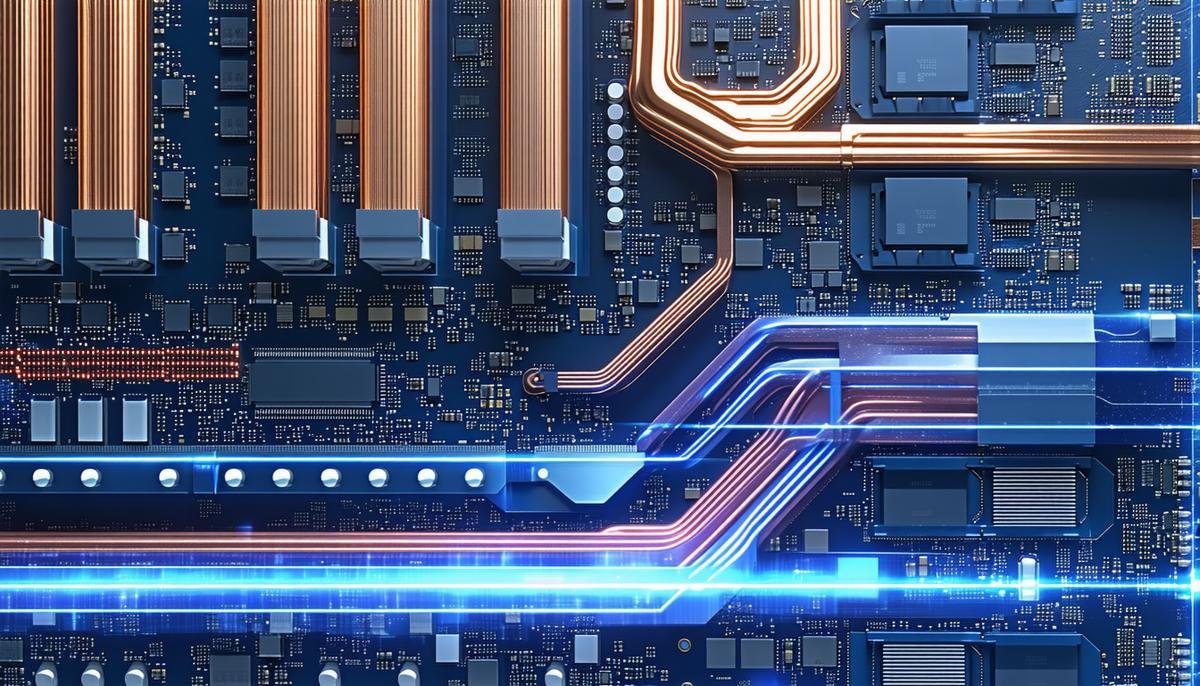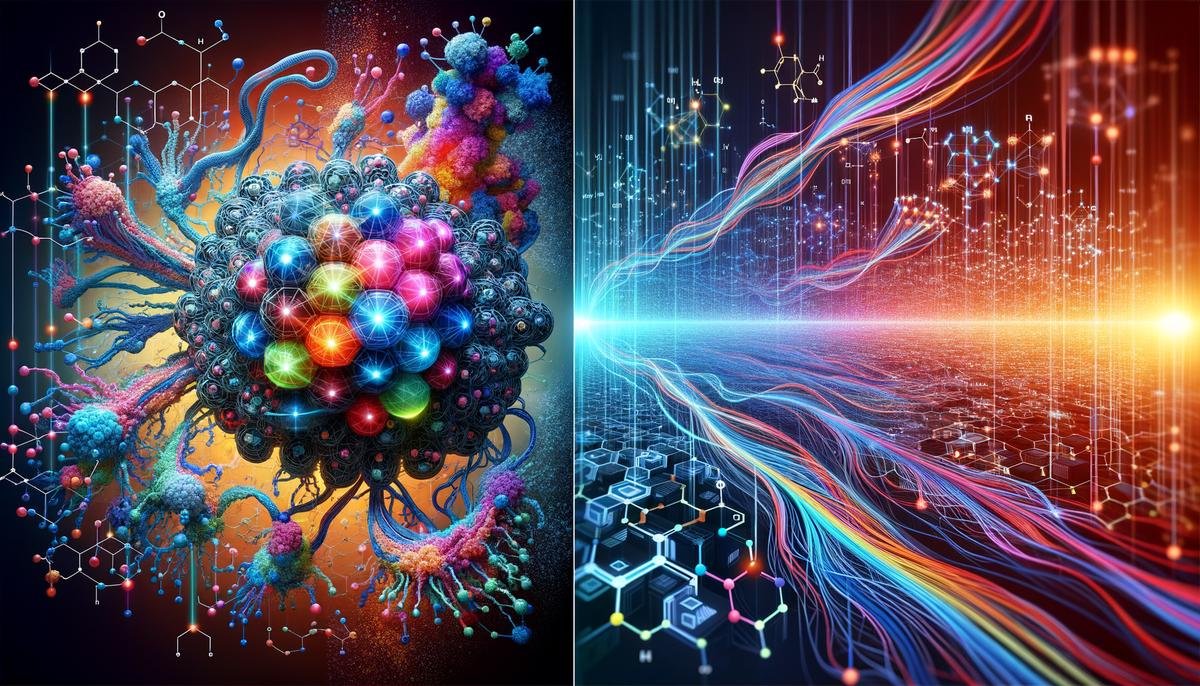Quantum Computing Basics
Quantum computing operates on fundamentally different principles compared to classical computers. While regular computers use binary bits toggling between 0 and 1, quantum computing leverages qubits that can exist in multiple states simultaneously through superposition and entanglement.
Qubits perform a kind of multitasking—existing in multiple states at once. This superposition allows quantum computers to process vast amounts of information simultaneously, rather than sequentially.
Entanglement enables instant information sharing between qubits, even across distances. These properties make quantum computing stand out from classical methods.
D-Wave Systems applies these principles to explore solutions classical computing can barely imagine, such as:
- Molecular simulations
- Optimizing complex systems in real time
However, quantum computing faces challenges:
- Limited qubit capacity
- Error correction issues
- Extreme precision required for handling and preserving qubits
Nevertheless, companies like Google and D-Wave are working to make their systems more reliable and accessible.
D-Wave's approach uses quantum annealing technology to accelerate AI training and enhance model efficiency. They're addressing previously unsolvable challenges in various industries.
The combination of quantum computing and AI has the potential to significantly advance technology beyond the capabilities of classical systems.

D-Wave's Quantum Technology
D-Wave Systems employs a distinct approach known as quantum annealing. This method is particularly effective for solving optimization problems that might challenge even classical supercomputers.
Recent advancements by D-Wave include enhancing their Leap quantum cloud service by incorporating GPUs. This combination of quantum and classical resources results in faster processing speeds, often leading to innovative outcomes.
"The thing that's so exciting is the sort of convergence of AI running with the help of a quantum computer. You would be able to maybe do things that you could never even imagine doing with a classical computer, no matter how powerful it was." – David Isaac, co-founder of AbaQus
Businesses have already seen tangible benefits:
- Pattison Food Group: Reduced computational times for auto-scheduling, achieving in seconds what previously took hours
- CaixaBank: Improved efficiencies in investment portfolio hedging
D-Wave's research collaborations with elite institutions demonstrate quantum's potential in various fields, including AI applications like predicting protein-DNA bindings with improved accuracy.
As Quantum AI evolves, D-Wave continues to push boundaries and invite new advances in computational capability.

Integration of AI and Quantum Computing
The convergence of AI and quantum computing creates powerful synergies. Quantum computing provides enhanced processing power, helping AI models handle problems that would overwhelm classical systems.
Industries are already experiencing benefits:
| Industry | Application | Result |
|---|---|---|
| Pharmaceuticals | Drug discovery | Potential medical breakthroughs |
| Logistics | Auto-scheduling | Reduced scheduling times |
| Finance | Computational tasks | Significantly decreased processing times |
Quantum-fueled AI ventures into areas previously unthinkable by classical standards, improving predictive models' accuracy and optimizing complex processes. The potential benefits include:
- Increased energy efficiency
- Enhanced data analysis capability
- Faster model training
As AI and quantum computing advance together, industries adopting these technologies are likely to see significant improvements in efficiency and capability.

Challenges in Quantum AI
Quantum AI faces several significant challenges:
- Limited qubit capacity: Current quantum systems have restricted computational capabilities.
- Error correction: Quantum states are easily influenced by external factors, making error correction a major issue.
- Specialized tools and algorithms: Traditional programming languages are not suitable for quantum computing.
Developers need to learn new computational paradigms foreign to classical approaches. Despite these challenges, companies like IBM, Microsoft, IonQ, and D-Wave are working to:
- Expand qubit numbers
- Enhance qubit coherence
- Develop better error correction techniques
Google has introduced AlphaQubit, an AI-powered decoder that identifies quantum computing errors with state-of-the-art accuracy. According to Google, it can reduce errors by 6% compared to tensor network methods and 30% compared to correlated matching methods.
As developers create more sophisticated algorithms and error correction techniques evolve, the potential of quantum AI comes closer to realization. These hurdles represent opportunities for innovation in this developing field.

Future Prospects of Quantum AI
Quantum AI has the potential to redefine various industries:
- Finance: Near-instantaneous risk assessments
- Healthcare: Accelerated drug discovery processes
- Logistics: More efficient optimization of complex routing problems
Realizing this potential requires overcoming current limitations in qubit capacity and error correction. Companies like D-Wave are working on:
- Expanding qubit capabilities
- Reducing error margins
- Integrating hybrid solutions that combine classical and quantum computing
D-Wave's role extends beyond technological development. Through partnerships and research, they're setting the stage for a new era where quantum AI could provide solutions for a wide range of industries.
As Quantum AI continues to develop, it promises to push the boundaries of what's computationally possible, potentially solving problems that are currently intractable and opening up new avenues for innovation across various sectors.

Quantum AI stands as an innovation beacon, merging two powerful technologies to reshape the future. By combining quantum computing and artificial intelligence strengths, we approach solving challenges once deemed impossible. This synergy promises to transform industries and expand the boundaries of possibility, offering a glimpse into a future brimming with potential and opportunity.
- Baratz A. D-Wave Quantum Inc. announces plans to strengthen connection between quantum optimization, artificial intelligence, and machine learning. D-Wave Quantum Inc. Press Release. July 29, 2024.
- Google DeepMind and Quantum AI teams. Introducing AlphaQubit: An AI-powered decoder for quantum error correction. Nature. 2024.
- Isaac D. The convergence of AI and quantum computing. AbaQus Research Report. 2024.



